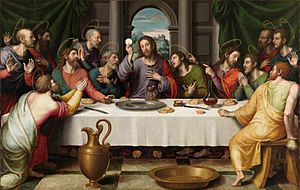Communion (Christian) facts for kids
The word Communion comes from the Latin word communio, which means "sharing in common." In Greek, a similar word is koinonia (κοινωνία), which is often translated as "fellowship" or "partnership."
In Christianity, "communion" means a very close relationship. It describes how Christians, both as individuals and as a church, connect with God and with each other.
Communion in the Bible
In the Bible, the Greek word koinonia is only found in the New Testament. It does not appear in the older Greek translation of the Old Testament, called the Septuagint. This word, or its different forms, appears in 43 verses of the New Testament.
What Does 'Koinonia' Mean?
The word koinonia is used in the Bible to describe sharing or fellowship in many ways, depending on the story. It can mean:
- Sharing with God: This includes being part of God's nature, connecting with God, Jesus, and the Holy Spirit. It also means sharing in Jesus's sufferings and his future glory.
- Sharing in Christian Practices: This refers to sharing in the "blood and body of Christ," which is a part of Christian worship.
- Sharing with Other Christians: This means having fellowship with other believers, sharing their difficulties, and sharing their faith.
- Sharing Spiritual Blessings: It can mean sharing in the good things that come from the Gospel (the good news about Jesus), or sharing in light rather than darkness.
- Sharing Support and Help: This includes sharing in the difficulties and comfort of others. It also means helping with their work, sharing their special gifts, and giving help when others have material needs.
- Sharing in Human Nature: It can describe the human body and nature that all people share.
- Sharing in Work: This can mean working together as partners, whether in everyday jobs or in religious activities.
Related pages
- Communion of Saints
- Full communion
Black History Month on Kiddle
Outstanding African-American Women
 | Jewel Prestage |
 | Ella Baker |
 | Fannie Lou Hamer |

All content from Kiddle encyclopedia articles (including the article images and facts) can be freely used under Attribution-ShareAlike license, unless stated otherwise. Cite this article:
Communion (Christian) Facts for Kids. Kiddle Encyclopedia.

